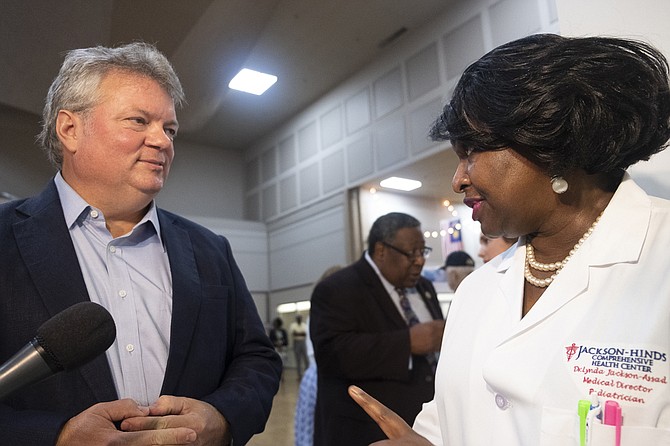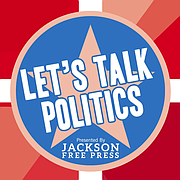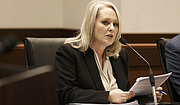Jim Hood, the Democratic nominee for governor, speaks with Dr. Lynda Jackson-Assad following a press conference at the Jackson Medical Mall on Aug. 28, 2019. Hood stressed the importance of health-care reform for Mississippians in his remarks. Photo by Seyma Bayram
JACKSON—On the heels of Tate Reeves' victory in the Republican runoff for Mississippi governor, Democratic nominee Jim Hood emphasized the urgency of health-care reform for Mississippians at the Jackson Medical Mall on Wednesday, saying it would remain a top issue in his campaign.
Hood shared his ideas on reforming the state's mental-health system and vowed to draw on his years as a prosecutor to expose what he called the "legal corruption" of the Legislature and its stalling of progress.
"Health care is a major issue in this election. It's a major issue for people all over the state, being in the Delta, in the hills, on the coast, in south and west Mississippi and here," he told a group of reporters before touring the facility.
Hood reiterated his support for expanding Medicaid in the state, which would bring health-care options to about 300,000 Mississippians in working households that make too much for traditional Medicaid but not enough for aid in obtaining private insurance through federal subsidies.
Mississippi 2019 Elections
Read stories about Mississippi's upcoming 2019 election, including the gubernatorial election.
Under the 2010 Affordable Care Act, which President Barack Obama signed into law, the federal government allocates more than $1 billion a year to Mississippi to pay for the expansion. But since the law took effect in 2010, Mississippi Republican leaders like Reeves, the lieutenant governor who presides over the Mississippi Senate, and Gov. Phil Bryant have refused to accept the funds.
"It won't be any cost to our taxpayers. Now, they try to claim that it isn't going to be, but it's not, you check the other states that have recently (expanded), there's a way to do it, to expand it," Hood said.
For the first few years, the federal government would pay 100% for the cost of Medicaid expansion in Mississippi, dropping to 90% in later years. In a straightforward expansion, that would leave the State on the hook for over $100 million. A 2015 Mississippi Institutions of Higher Learning study did find, though, that expansion would create around 10,000 jobs and add $96 million to the state's economy.
Hood Willing to Consider Waller's Medicaid Plan
To pay for health-care expansion, Hood could use the "Medicaid reform" plan Reeves' now-defeated GOP runoff opponent, Bill Waller, proposed. Waller's plan would have covered expansion costs by levying $20 monthly premiums for recipients of expanded Medicaid and $100 fees for going to an emergency room for a non-emergency.
The Mississippi Hospital Association crafted Waller's plan, agreeing to cover the rest of the costs because Medicaid expansion could help save dozens of rural hospitals in the state by cutting down on the number of people getting emergency-room care with no ability to pay.
The MHA designed its plan to appeal to Republicans opposed to a straightforward expansion that would be free to its beneficiaries. U.S. Vice President Mike Pence implemented a similar expansion plan when he was governor of Indiana.
What Mississippi Voters Want from Candidates, Media
Ashton Pittman talks to Mississippi voters about the solutions they want to hear about over just the usual horserace of campaigns. #MSCitizensAgenda
On Tuesday night, Hood told the Jackson Free Press that he would be willing to consider a plan like the one Waller proposed.
"I assume that we'll have the same conservative Legislature that we've had. I ran this race based upon that," he said. "But the votes are there now because of things like happening in my hometown where a 22-year-old young lady died on the streets of Houston, Mississippi, from an asthma attack because our emergency room was closed."
He was referring to Shyteria Shardae "Shy" Shoemaker, who died after suffering an asthma attack in February, the Chickasaw Journal reported. Friends called 911 at 1:18 a.m. to say they were taking her to the hospital in Houston, but the operator told them its emergency room had closed in 2014 under financial strain.
Once they arrived at the fire department eight minutes later, an ambulance came and drove Shoemaker about 30 minutes further to the Baptist Memorial Hospital in Calhoun City. At 2:38 a.m., an hour and 20 minutes after her friends first dialed 911, emergency-room workers pronounced her dead.
Just four months earlier in October 2018, Hood had announced his campaign in Houston, his hometown. There, he called for Medicaid expansion, warning of the dangers of rural hospitals like the one in Houston closing.
"We had an emergency room here in Houston my whole life, and now that emergency room is closed," Hood told supporters in Houston at the time. "In 1940, we had better emergency health care in rural Mississippi than we have right now. That's insane."
Reeves Opposes 'Obamacare Expansion'
Stories like the one in Houston, Hood told the Jackson Free Press Tuesday night, "have made it possible for those legislators to get out, with just a little bit of leadership, and vote on some version (of Medicaid expansion), and it won't cost the taxpayers any money."
Reeves opposes Medicaid expansion, which he calls "Obamacare expansion." The Mississippi Medical Association's political action committee, which advocates for physicians and calls itself the "I.V. League" of donors, has endorsed Reeves, and its PAC donated $20,000 to his campaign in July.
The GOP nominee's health-care plan is to offer tax breaks to physicians who relocate to under-served rural areas and to businesses that support rural hospitals. He also wants to bring more telehealth businesses into the state.
Let's Talk Jackson Politics Podcast
Issues-focused election podcasts with Hinds County, legislative and statewide candidates focusing on substance over partisan horse-race politics.
Hospital-backed PACs that support Medicaid expansion have donated to Hood as well. His second-largest donor, Friends of Mississippi Hospitals PAC, donated $50,000 to his campaign in July.
Hood: Mental Health a 'Huge Issue'
The Democratic nominee also spoke with the Jackson Free Press about his views on expanding mental-health services in Mississippi, calling it a "huge issue." The attorney general's legal team spent much of the summer defending Mississippi in a federal court in Jackson against a lawsuit in which the U.S. Department of Justice alleged that Mississippi violates the civil rights of its mentally ill residents by not providing proper mental-health resources and facilities.
"I've advocated for mental health for years here in our state, in part because we've been sued. I've had to defend (against) that," Hood said. "... You have to (provide) health care to those out in the community—mental-health care to those who are able to live out in the community. And so, at some point, the judge is going to rule—probably in the next month or two—at some point if we expand, we can help finance and make sure that we provide that."
Because Mississippi does not have enough trained psychiatrists, Hood's plan for improving mental-health service access in the state will rely heavily on training nurse practitioners, he said. He said Mississippi only graduates about five psychiatrists a year.
"Our state, we don't have the resources, so we're going to have to depend heavily on nurse practitioners that specialize in the area of (psychiatry) to get them out and encourage them to work in other areas that our doctors hadn't gone (to)," Hood said.
He said he had unsuccessfully asked the Legislature "for years" to use money his office won in court cases, like one against a pharmaceutical company, to give millions to the University of Mississippi Medical Center to help train more psychiatrists.
Hood said he is optimistic about the future of health-care in the state.
Will a Court Force Mississippi to Change on Mental Health?
In a 2017 report, ProPublica identified more than 100 cases in which Mississippians with mental illnesses were spending long periods in jail waiting for a bed or evaluation from the state hospital.
"I think that there's a coalition of people in the Delta, in different places, Republicans and the Democrats. And that's what is encouraging about this issue, is that it brings all of us together, and we can govern with that kind of coalition."
When asked by a reporter whether he would ask for Waller's endorsement, Hood remarked that he would welcome it and that Waller's indecision on endorsing Reeves already spoke volumes.
"Obviously, last night he did not endorse Tate Reeves," Hood said on Wednesday. "I suspect he will not do that, and I don't blame him. ... Just that silence means so much to me, I think."
General Election on Nov. 6
Reeves won Tuesday night's runoff with 54% of the vote to Waller's 46%. Reeves, Waller noted in his speech that night, outspent him 5-1, thanks to his significantly better and nationally connected fundraising operation.
Voters will choose between Hood and Reeves in the general election on Nov. 6, 2019. Voters must register 30 days before an election to be eligible to vote.
More information on voting, voter registration and voter ID is available on the secretary of state's website at sos.ms.gov.
Follow City Reporter Seyma Bayram on Twitter @SeymaBayram0. Send tips to seyma@jacksonfreepress.com. Follow State Reporter Ashton Pittman on Twitter @ashtonpittman. Send tips to ashton@jacksonfreepress.com. Read more about statewide elections at jacksonfreepress.com/2019elections.
More like this story
- Medicaid Expansion Debate at Center of Waller v. Reeves Runoff
- Jim Hood, Tate Reeves: Real Issues on Center Stage in Governor’s Race
- GOP Insider: Foster to Endorse Ex-Opponent Waller in Runoff for Primary Nod for Gov
- GOP Gov Hopefuls: Expand Medicaid to Help ‘Working’ People; Reeves Abstains
- False Claims in Tate Reeves' 'Obamacare' Mailers on Waller Plan







Comments
Use the comment form below to begin a discussion about this content.